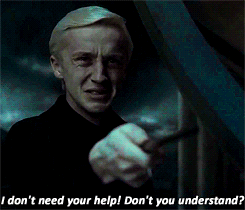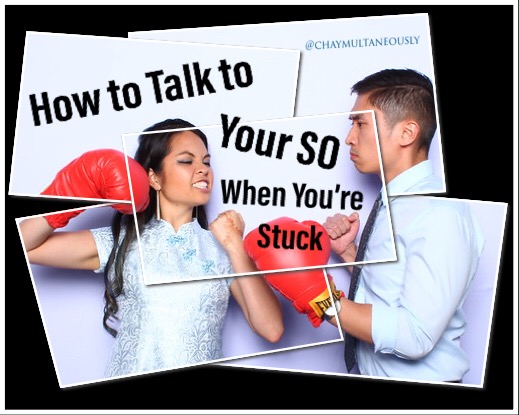Post-Traumatic Cheating Disorder: Why It Hurts So Bad and How to Start Healing
Even if you've never experienced it yourself romantically, we all know the feeling of the pain of being promised one thing and receiving less or nothing at all. Cheating is a break of trust; as social creatures, our very survival depends on trust. So it makes sense that it's a pretty big fricken deal when it happens.
 |
| for those of you looking for more nerdy brain facts |
 |
| me asking my emotions what they did |
There are 4 main attachment styles. To help me illuminate.. one of my favorite series ever, Harry Potter will help [also, if you haven't seen any of the films.. there are a lot of spoilers ahead]:
Secure
Preoccupied/Anxious
 |
Dismissive-Avoidant |
Fearful-Avoidant
If you're curious, you can take this very short (3-4 minute) survey (survey B) on what your attachment style is. And yes, it can change!
So what does this have to do with cheating?
Each of these people could be cheated on; our attachment style tells us how we deal with the pain. And it also tells us how to start healing!
In a nutshell, you aiight. People who have secure attachments can operate under the notion that people come and go, that things grow and fade, and that one relationship ending is a part of their journey but does not mean anything about who they are.
Hermione is a perfect example; [spoiler alert, but it's been like ages now] she and Ron fall in love and then Ron gets real jealous and makes a big mistake and abandons them on their quest to search for the horcruxes. Her response? She is extremely hurt, and yet, she is determined to finish her quest to help Harry and though worried for his safety, she is not frantically trying to find him, nor is she claiming he doesn't matter or that she doesn't care about him anymore.
 |
| she is really mad at him though. and that is perfectly understandable and healthy |
This might be obvious, but preoccupied/anxious babies cry wildly for their mothers/fathers/caregivers during studies and they are constantly looking for them until they are found; if left long enough, they give up. Their parents were often unpredictable, perhaps in one moment being comforting and loving, and then in another moment unable to be found, or even harsh and critical.
3. Dismissive/Avoidant
If you have ever said, "I don't care about them anymore" then you've delved into the way someone who is dismissive/avoidant solves their problems most of the time. You take being an "independent woman" or a "true playa" to the maximum level--your reaction to your parents' absence was to convince yourself you could figure out how to do this on your own.
Oh Ron. Ron. Ron Weasley.
Fearful avoidant is close to dismissive, but instead of insisting that you don't need anyone, you say that you need someone and then push them away. Or avoid them altogether.
[also very old spoiler alert] In book 4, Goblet of Fire, he and Harry get into a long stiffened silence (can we call that a fight?) when he gets jealous that Harry is going to be a Triwizard champion. Up until this point, Ron and Harry have been nearly inseparable, but Ron actually hasn't shared many of his insecurities with Harry. Ron's jealousy pushes him away. He does the same thing to Hermione, asking her to the ball "as a last resort" when he really did want to go with her, then bullies her about her date/his idol, Viktor Krum. Fearful/avoidant will often seek closeness and then do things to make the other person upset or angry, which makes their close friends and significant others extremely confused.
Beginning to Heal
 |
| Hermione always knew. So brilliant. |
Cheating will only exacerbate the attachment styles 2-4. It's another reason in the pile of reasons not to trust people.
Each attachment style will need to heal in their own ways, but this is a good baseline for all of them.
To start, my recommendation is to start securely attaching to yourself and be the loving parent for your inner child self that is stable and kind:
Sources: Emotionally Focused Couples Therapy with Trauma Survivors, S. Johnson 2005; PsychAlive.org; PsychologyToday.com
Each attachment style will need to heal in their own ways, but this is a good baseline for all of them.
To start, my recommendation is to start securely attaching to yourself and be the loving parent for your inner child self that is stable and kind:
- Recognize that your reaction to cheating isn't always about the cheating. It's about your past trauma too. So this trust violation is going to be a reminder of the past trust violations you've had in the past, tracing all the way back to the way you felt when your parents left you alone and they were nowhere to be found. Your emotions could be inaccurate / disproportional to the thing happening right now, because it's compounded by what happened before.
- Take steps back. Freeing yourself from the person who cheated, even if you're still together (which is totally possible, and when overcome makes the couples even stronger), means taking time out for yourself, focusing on the things you value most.
- Connect with more people who aren't your significant other (or ex) more often. Talk to them about things that matter to you.
- Do things that you like because you like them.
- Set a boundary, whether it is in time and/or space, for when you engage with things that upset you quickly. Set limits, make sure you see them or talk to them or text them or whatever exposure you can with them--on Your terms. If they are constantly invading your space, whether by popping up on your phone or showing up where you are, you will feel less in control.
- (If you're wondering, yes, I had to do this myself - and I am slowly edging myself out of anxious attachment if you hadn't guessed already!)
Okay that was a long one, you deserve a prize! Thank you for reading always.. I'm feeling so much love so thank you thank you thank you!!
Sources: Emotionally Focused Couples Therapy with Trauma Survivors, S. Johnson 2005; PsychAlive.org; PsychologyToday.com















A lot of people go through pains in their relationships it’s hard to give up on true love, sometimes we pretend to be fine but we are not, fighting to get the one we love is also fighting to get back our joy and happiness. Lord Zakuza is here to help the broken hearts for he's capable and able to get your EX lovers, partners, wife and husband back with he's powerful love spells. Get in touch with him as soon as you can through his website: lordzakuzaspells.com or WhatsApp number on +1 (740) 573-9483 or email him through lordzakuza7@gmail.com
ReplyDeleteUnderstanding post-traumatic cheating disorder is crucial. Healing begins with self-care, therapy, and rebuilding trust, paving the way for emotional recovery. Important topic.Dynamic Family Therapy LLC
ReplyDelete